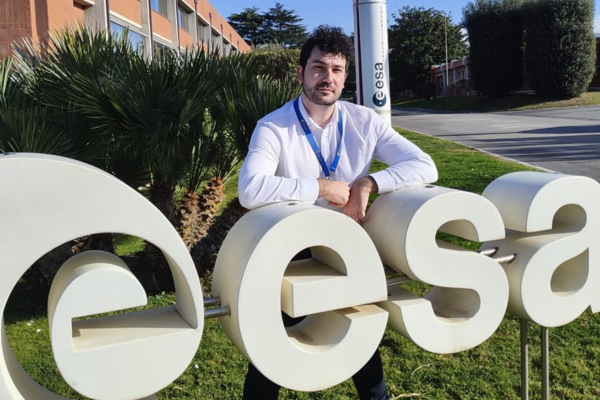Gillian Rowan is the latest SmartSat PhD student to be selected for an exclusive ten-week internship at the European Space Agency’s (ESA) Φ-lab.
The University of Queensland (UQ) student is currently completing a PhD looking at how remote sensing technologies can be applied to kelp biomass mapping across spatial scales – from single forests to the continental Australian extent – accurately and efficiently. She is undertaking this work as a member of the Earth Observation Research Centre and the Marine Ecosystems Monitoring Lab, both located at UQ.
 A drone image of a fringing Giant Kelp forest in Akaroa Harbour, New Zealand.
A drone image of a fringing Giant Kelp forest in Akaroa Harbour, New Zealand.
However, for the next couple of months, Rowan will shift to contributing to the development of a model for directly extracting measurements and information from imaging radar data at ESA Φ-lab. Employing cutting-edge deep learning techniques, this innovative model aims to enable future analysis and research by transforming raw radar images into interpretable, task-agnostic data.
Located in Frascati, Italy, ESA’s Centre for Earth Observation (ESRIN) is a global leader in pioneering research and innovation in Earth Observation.
Rowan is looking forward to being surrounded by the expertise, energy and creativity that drives the people working at the world-class facility.
“Φ-lab specifically focuses on producing effective and impactful research; I’m excited to learn from the lab’s experts about emerging technologies in Earth Observation and generating impact through my work,” Rowan said.
 A single Bull Kelp (Durvillaea) individual, laid out on a South Australian beach…with Rowan for scale.
A single Bull Kelp (Durvillaea) individual, laid out on a South Australian beach…with Rowan for scale.
“Beyond the technical skills I’ll be able to apply to my future work, I hope that the connections I make during my time at ESRIN will last throughout my career. With a research network spanning North America, Australia, and Europe, I could be well positioned to participate in, and contribute to, global scale research.”
 Rowan studying persistent Giant Kelp (Macrocystis) forests in Akaroa Harbour, New Zealand in collaboration with local kelp harvesters, Kelp Blue and NZ Kelp, to survey wild kelp forests growing along the rocky harbour shores.
Rowan studying persistent Giant Kelp (Macrocystis) forests in Akaroa Harbour, New Zealand in collaboration with local kelp harvesters, Kelp Blue and NZ Kelp, to survey wild kelp forests growing along the rocky harbour shores.
During her internship, Rowan will be guided by her research mentor, Roberto Del Prete, a former SmartSat Visiting Researcher and by Dr. Nicolas Longépé, senior data scientist at Φ-lab. Now an Internal Research Fellow at Φ-lab, Del Prete previously worked on projects related to the South Australia Space Services Mission’s satellite, Kanyini, during a three-month stint in 2023 at SmartSat’s SCARLET Lab.
Reflecting on his experience, Del Prete shared, “My time working with AI and space-based technology at SmartSat was transformative. We made significant breakthroughs in real-time data processing, which not only advanced Earth Observation but also changed how we interact with our planet from space.”
 Internal Research Fellow at Φ-lab, Roberto Del Prete, who formerly visited SmartSat HQ in early 2024, will be one of Gillian’s research mentors during her internship.
Internal Research Fellow at Φ-lab, Roberto Del Prete, who formerly visited SmartSat HQ in early 2024, will be one of Gillian’s research mentors during her internship.
Rowan’s internship at Φ-lab marks a significant step in her academic and professional journey, offering invaluable experience at the forefront of space-based technology and Earth Observation research.
“This is my first time participating in an experience like this,” she expressed.
“It really is a once in a lifetime opportunity!”
Rowan holds a Bachelor of Science in Environmental Sciences – Biodiversity and Conservation and a Master of Science in Geography from McGill University in Montreal, Canada. Her Master’s thesis used laboratory and in-situ hyperspectral measurements to differentiate and map freshwater vegetation species. Before moving to Brisbane to study at UQ, Rowan was a member of the operations team at GHGSat, a methane monitoring company employing satellite and airborne technologies to detect fugitive methane.
Featured image: Gillian Rowan out on the water in Fortescue Bay, Tasmania, to collect in situ spectral reflectance measurements of kelp and other macroalgae.